Christian Pastors In Alabama Seek To Build Momentum In Opposing Roy Moore
While some evangelicals are staunchly standing by the embattled Alabama Senate candidate Roy Moore, a grassroots network of Christian leaders in the state are joining forces to present a different image of Christianity.
Dozens of Alabama ministers have signed a letter that calls out Moore’s “extremist beliefs” and says that no person of faith should be able to support him.
“Even before the recent allegations of sexual abuse, Roy Moore demonstrated that he was not fit for office, and that his extremist values and actions are not consistent with traditional Christian values or good Christian character,” the pastors wrote in the letter. “He and politicians like him have cynically used Christianity for their own goals. But Roy Moore does not speak for Christianity, and he acts in ways that are contrary to our faith.”
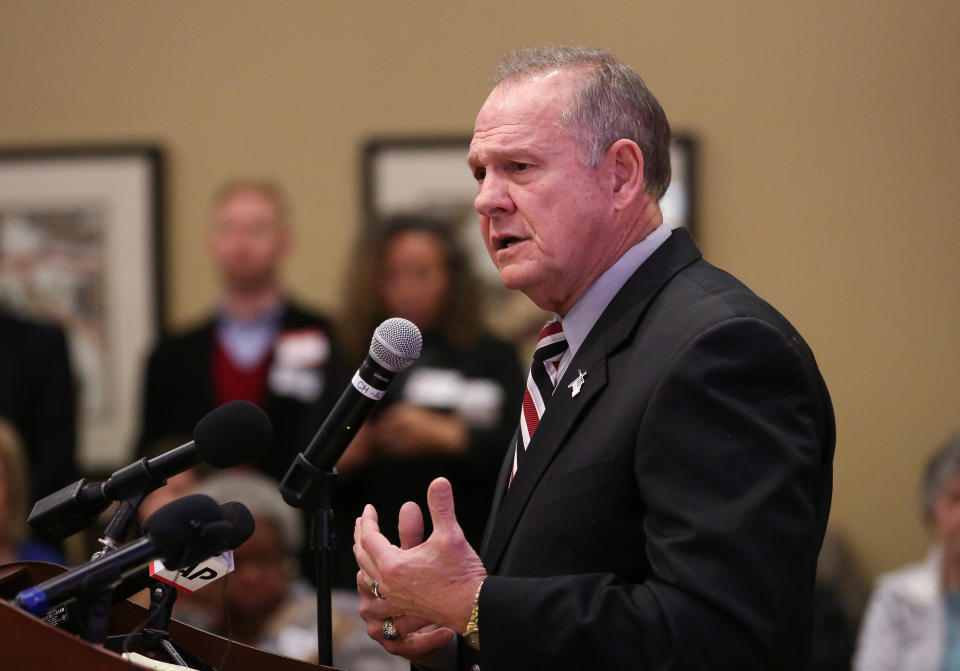
More than 55 Alabama pastors initially signed the open letter on Nov. 16. Hundreds of other ministers and lay Christians from within and outside of Alabama have added their names to the campaign after it was posted online on Nov. 18 to the petition site Groundswell, operated by New York’s Auburn Theological Seminary.
The ministers from Alabama appeared to be predominantly from mainline Protestant churches, which are a minority in Alabama’s largely evangelical Protestant religious landscape. Other signers were from historically black Baptist congregations or non-denominational congregations.
Since early November, Moore has been battling allegations that he sexually assaulted or targeted teenage girls when he was in his 30s. Moore has repeatedly denied the mounting attacks against his character, claiming that they are politically motivated.
Some evangelical Christian leaders have stood firm in their support of the candidate, while others are wavering.
But for progressive Christians in Alabama, the allegations against Moore were another nail in the coffin, reinforcing a view of him that has been negative for quite some time.
Moore, a Southern Baptist, long has been a controversial figure in Alabama’s politics ― and nationally, as well. He’s been booted from his post as chief justice of the state’s Supreme Court twice ― first, for refusing to remove a Ten Commandments monument from the state judicial building, and later for ordering probate judges to refuse to issue marriage licenses to same-sex couples after the 2015 U.S. Supreme Court decision legalizing such unions.
The pastors’ letter refers to Moore’s virulently anti-queer and anti-Muslim stances, as well as his championing of Christian nationalism.
“It is our belief that in light of Roy Moore’s extremist beliefs, his patterns of behavior, and the recent allegations against him, no person of faith can, in good conscience, support him or his religious nationalism,” the pastors wrote. “He has done harm to our government; he has done harm to our Christian witness; and he has done harm to vulnerable people.”

Rev. Dr. Dave Barnhart, Jr., who pastors a group of United Methodist house churches in Birmingham, Alabama, brought the campaign to Groundswell. He told HuffPost that the idea for the letter began organically on a Facebook post, after some clergy suggested responding together to news that conservative Christian pastors in Alabama had released a letter endorsing Moore. (It turns out this endorsement was actually a re-release of an earlier letter written in August, and that some of the signatories had not been contacted about the update).
Barnhart said he hopes the letter will encourage voters who don’t typically show up to the polls to take part in Alabama’s Dec. 12 special election. He also hopes to reach conservative Christians who are on the fence about Moore.
Another target audience is non-Christians, he told HuffPost.
“I would hope that for those who have rejected Christianity because they think it means being authoritarian, anti-gay, and anti-Muslim, that they would hear that Roy Moore does not speak for us,” Barnhart said in an email.
This desire to present an alternate vision of Christianity is also what motivated Rev. Jennifer Sanders, pastor of Beloved Community Church in Birmingham, Alabama, to sign the letter. She told HuffPost in an email she believes the letter “disrupts the illusion of consensus, the notion that Christianity in Alabama speaks only with a fundamentalist voice.”
“I signed the letter because in his career Roy Moore has consistently advanced an agenda that denies that all people ― in our beautiful diversity ― are made in the image of God,” she said. “His demagoguery contradicts the continual Gospel emphasis on siding with the marginalized.”
Below, Alabama faith leaders hold a press conference to condemn Roy Moore’s policies.
Adam Mixon, pastor of the Zion Spring Baptist Church in Birmingham, told HuffPost his congregation tends to be conservative on moral issues. But because of its history as a black church in a poor neighborhood, the church’s politics tend to lean toward supporting minorities.
The sexual assault allegations against Moore simply solidified Mixon’s resolve to reject the candidate and his policies.
“I hope signing the letter causes others to begin to question the inconsistency in application of the core Christian principle of ‘loving one’s neighbor’ by many white conservative evangelicals,” he said.
Rev. Carolyn Foster, a deacon at St. Mark’s Episcopal Church in Birmingham, told HuffPost that Moore’s policies reminded her of the “violence, injustice, and abuse of power” once sanctioned by Christians in the segregated South.
She signed the letter because Moore’s brand of Christianity “does not align or even closely resemble” the nature of God.
“For me, it is not about being a progressive or a conservative Christian; it’s about being right or wrong as it relates to Christian teachings and values,” she said. “Christian allegiance should be to God, not party affiliation. I pray this letter embolden more Christians who feel as I do to speak up against the misuse of the faith.”
The full letter:
November 16, 2017
An Open Letter From Alabama Pastors About Roy Moore
Under ordinary circumstances, we clergy refrain from speaking directly about political candidates, and only speak to issues. But these are not ordinary circumstances.
Even before the recent allegations of sexual abuse, Roy Moore demonstrated that he was not fit for office, and that his extremist values and actions are not consistent with traditional Christian values or good Christian character. He and politicians like him have cynically used Christianity for their own goals. But Roy Moore does not speak for Christianity, and he acts in ways that are contrary to our faith.
Christianity affirms God’s love for the neighbor and care for the most vulnerable in society: the widow, the foreigner, and the orphan. But he has denigrated people from other countries and other faiths. He opposes the expansion of Medicaid which would provide basic healthcare for over 400,000 poor and working poor Alabamians. He seeks to deny the most basic civil rights of our fellow citizens. He has used racial slurs and casually referred to state-sponsored violence against lesbian and gay families. He has sought to deny children without parents access to loving families on the basis of sexual orientation. Kindness and justice toward widows, orphans, and foreigners are priorities in the Bible but they are not priorities for him.
Christianity thrives in religious freedom from government interference, and a government impartial toward people of all faith traditions. But instead he has sought to entangle government with religion. He has preached vehemently against Islamic religious law but he has sought government affirmation of his religious extremism and nationalism. He has claimed civil rights only apply to Christians.
Christianity rejoices in the truth and affirms the rights of abuse survivors to tell their stories without silencing. Christianity abhors sexual coercion and violence. We acknowledge that many people have been victims of sexual assault and abuse in our own places of worship. Clergy misconduct has done real and lasting harm, both physically and spiritually. We repudiate the actions of religious and political leaders like Roy Moore who have sought to silence, to cover up, and to be complicit in the sexual abuse. These actions reopen the wounds of anyone who has been abused by leaders who should have been committed to compassion, to justice, and to healing God’s world.
We clergy write and sign this letter not as representatives of our own congregations but as individual faith leaders compelled by conscience to speak. Our intent is not to tell anyone how to vote, but to urge the people of Alabama to vote their conscience, regardless of political affiliation. It is our belief that in light of Roy Moore’s extremist beliefs, his patterns of behavior, and the recent allegations against him, no person of faith can, in good conscience, support him or his religious nationalism. He has done harm to our government; he has done harm to our Christian witness; and he has done harm to vulnerable people.
We do not make this statement lightly. We do so with much prayer and discernment. We believe no follower of Jesus Christ should be silent while the words of our Lord and Savior are perverted for partisan power, while our Bible is appropriated as a weapon for a false “culture war,” and while the name of our God is blasphemed by the hypocrisy of those who claim the name of Christ.
Love HuffPost? Become a founding member of HuffPost Plus today.
Also on HuffPost
Rev. Jennifer Bailey
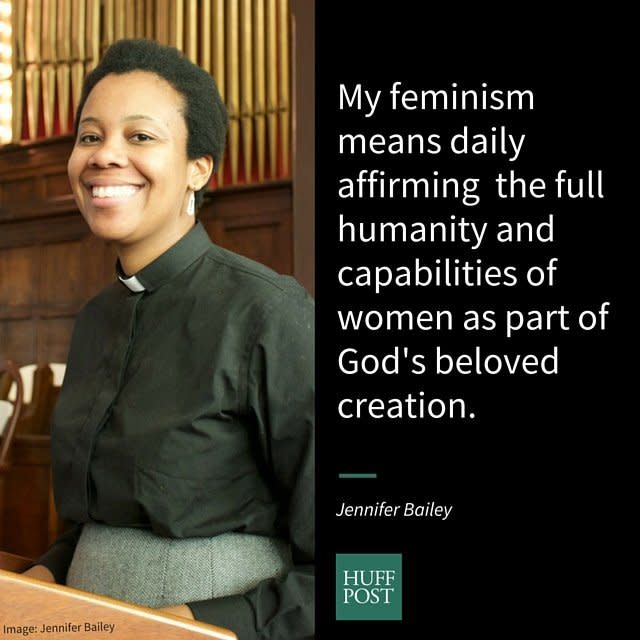
"As a Christian leader, my feminism means daily affirming the full humanity and capabilities of women as part of God's beloved creation and their sacred work in the world. It also means honoring the sacrifices, courage and labor of the many female saints of God that it made it possible for me to wear my clerical robe and preach the gospel of Jesus. Historic figures like Jarena Lee, Harriet Tubman, Sojourner Truth and Bishop Vashti Murphy McKenzie paved the way for me as did the unsung (s)heroes and everyday church mothers whose work has kept the church alive and flourishing since its inception. We still have a long way to go to completely shatter the stained glass ceiling but the ancestors have shown is it is possible by holding to God's unchanging hand. Blessed be her Holy Name."
Sarah Bessey
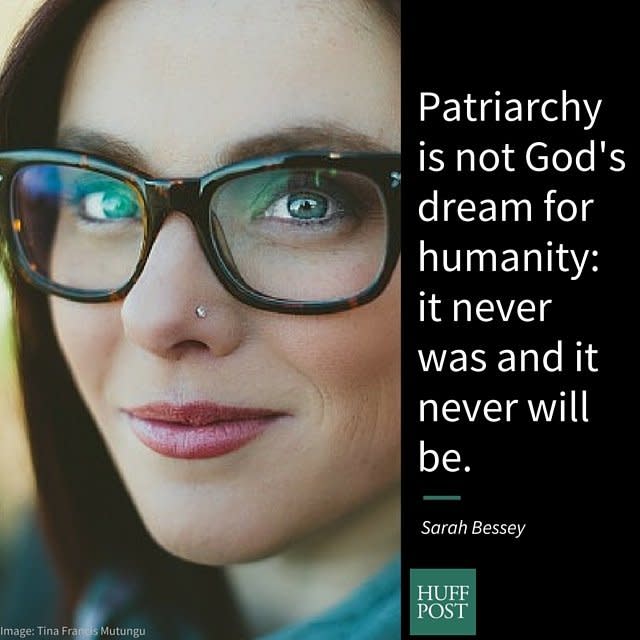
"It was following Jesus that made a feminist out of me! That discipleship lead me to caring about everything from maternal health in Haiti to sexism in the Church as issues of justice close to God's heart. Patriarchy is not God's dream for humanity: It never was and it never will be. I remain hopeful, too - more and more people are waking up to what wholeness and peace-making can look like for both men and women in the Kingdom of God which changes things on both a small personal scale but also helps to move the needle forward when it comes to systemic injustice, too."
Vicky Beeching
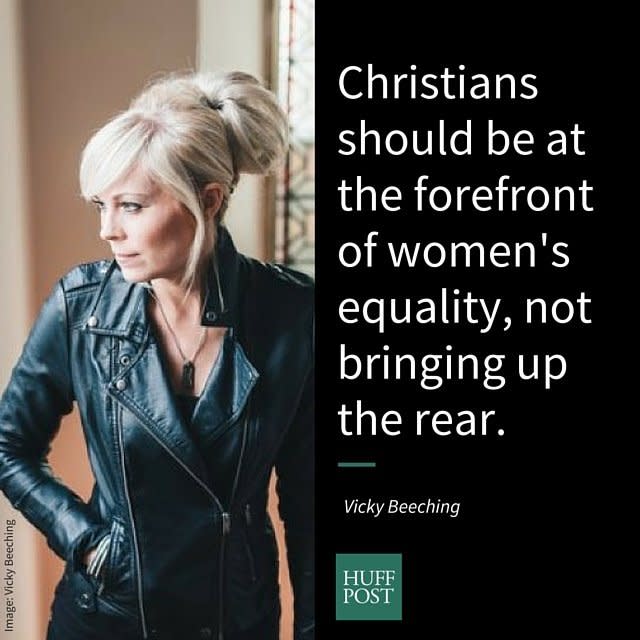
"To me, feminism means championing the rights and equality of women. Jesus treated women in ways that were truly radical for his era, so I've argued for years that Christ should be considered a feminist. The church has seemed afraid of the feminist movement, unsettled by it somehow; branding it as harsh and shrill. That seems bizarre as Christians should be at the forefront of women's equality, not bringing up the rear! Many denominations still don't let women preach, become Elders, or get ordained, so there's much work to be done. 'Christian feminism' is not an oxymoron; it's a deeply compatible, healthy response to the injustices that still exist within the faith community."
Gail Song Bantum
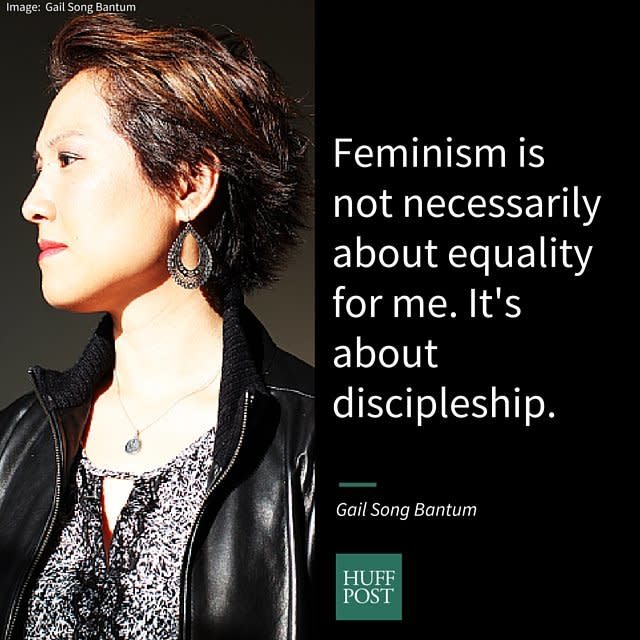
"Feminism cannot merely be an idea but a life embodied. For those of us women who have fought to live out our call in spaces of leadership within the church, we embody feminism daily whether we realize it or not. Any embrace of feminism within the church must be rooted in our deep conviction that we are all created to be free -- that it was for freedom that Christ set us free (Galatians 5:1). It is a desire for this freedom to emerge from the truth that both women and men are created fully and wholly as image bearers of God. In that sense, feminism is not necessarily about equality for me. It's about discipleship - about honoring the creativity of God in our midst, about enabling others to flourish, about fighting for another's freedom, and about submitting to the truth that we have all been gifted this breath each waking moment of the day."
Rev. Dr. Paula Stone Williams
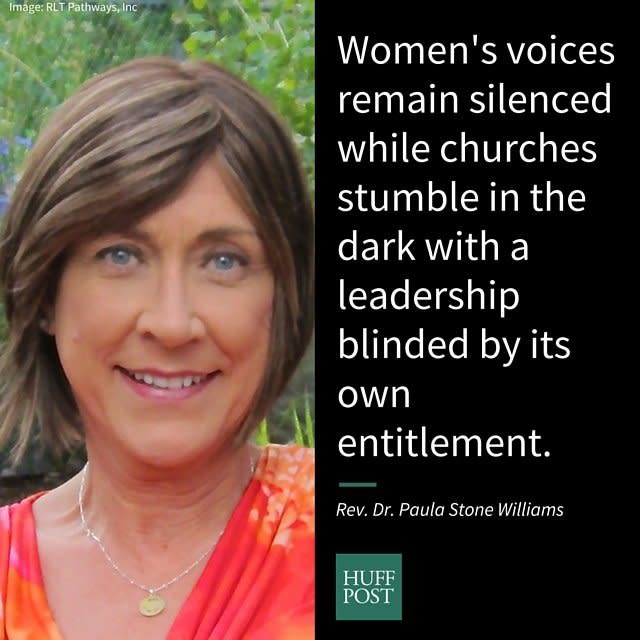
"I have preached in three of the twelve largest churches in America. Today I would not be allowed in the pulpit of a single one. Not only would I be barred because I am transgender, I would be barred because I am a woman. The irony is the things I know now make me twice the person I was before. But women's voices remain silenced while churches stumble in the dark with a leadership blinded by its own entitlement. It has made me into something I never expected I'd be -- a feminist."
Edyka Chilomé

"As a woman of color I don't identify as a feminist although I walk in solidarity with my feminist sisters and am working toward similar goals of transformative justice. I grew up in a christian context that inherited liberation theology born from third world liberation struggles and the continuous survival of indigenous mestizo peoples in the global south. My Christianity looked like rallies at the capital Sunday morning led by indigenous mestiza women who made very clear for me that God, in whatever form, is calling us to walk with the earth’s people and honor life first. This means that the world is my parish, and at the end of the day, compassion and accountability go hand and hand."
Mica McGriggs
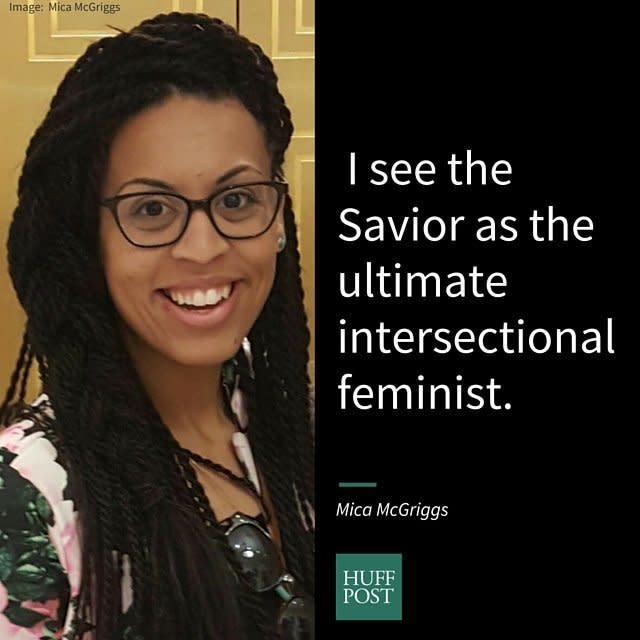
"Feminism for me as a Christian means I am working toward being more like Christ; I see the Savior as the ultimate intersectional feminist. He was always concerned and working for 'the least of these' he looked to the margins and created spaces that were inclusive to all. That is what intersectional feminism aims to do. The church would be a safer and more loving environment for all God's children if they were to embrace liberation theology and the practice of intersectional feminism."
Rev. Christine Lee
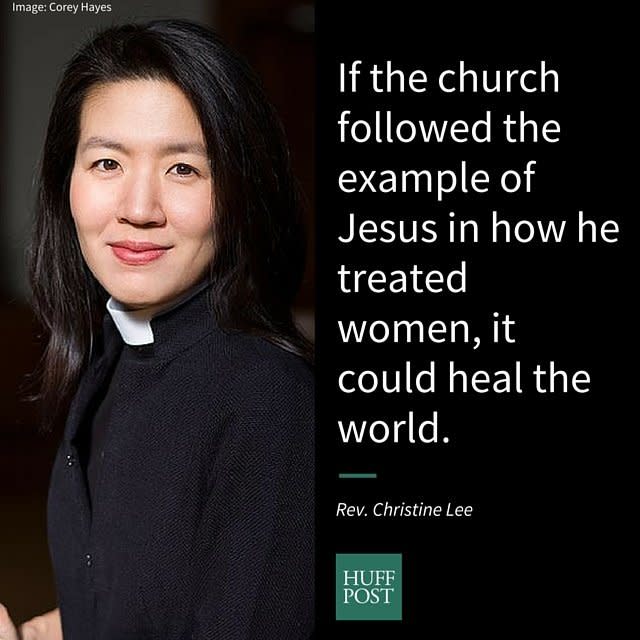
"As a Christian, to me feminism is about seeing and valuing women as Jesus did. I'm always moved by the stories of Jesus' interactions with women in the gospels. In a time and culture where women were often invisible, he saw them and treated them as ones who were honored by God and deeply loved. If the church followed the example of Jesus in how he treated women, it could heal the world. Just like the human body, the whole flourishes when every part is made stronger."
Nicole M. Garcia
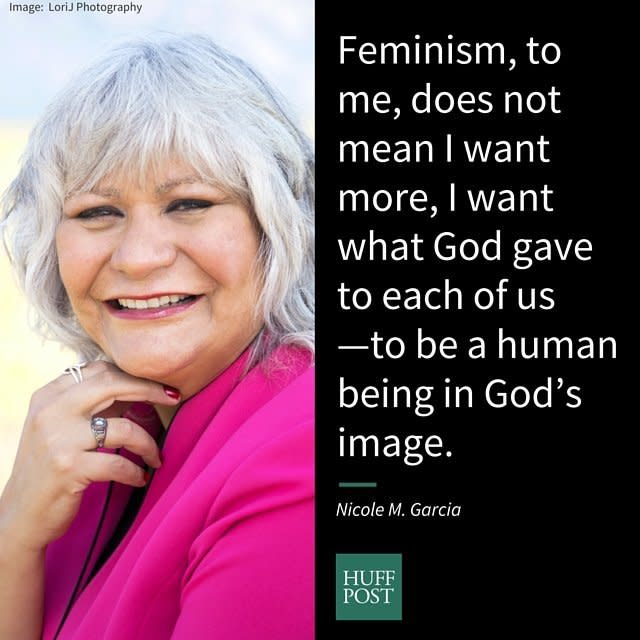
"Genesis 1: 27 is very clear: God made humankind in God’s image. Feminism, to me, does not mean I want more, I want what God gave to each of us -- to be a human being in God’s image. The church has subjugated women far too long and it is time to emphasize the love and compassion Jesus taught us in the Gospel."
Bishop Minerva G. Carcaño
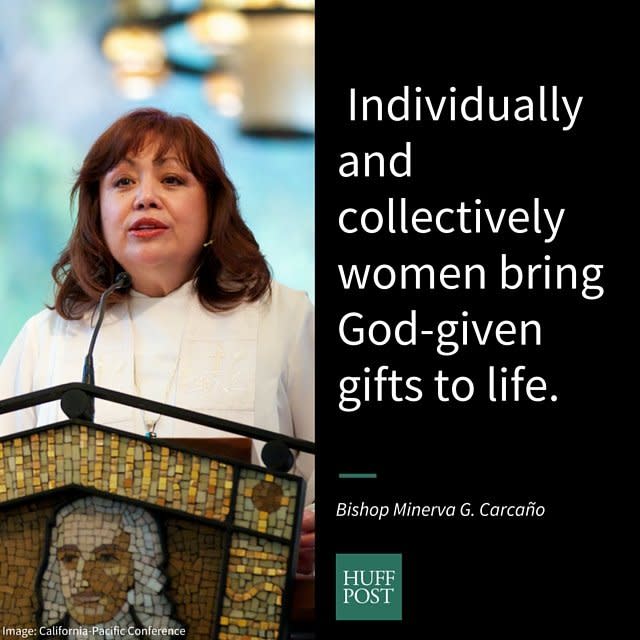
"As a Christian, I view feminism as a commitment to women having the opportunity to fully be who God created us to be. Creation itself allows us to catch a glimpse of God’s amazing creativity with all its beauty, potential and interrelationship. Individually and collectively women bring God-given gifts to life. The church has a responsibility to remind the world of the sacredness of all life including that of women. When women suffer because of discrimination due to their gender, everyone suffers through the loss of the gifts women bring to the world."
Monica A. Coleman

"For me, feminism in religion is about voice and power. It's about what I notice and what kinds of questions I ask: Where are the women in the story? Who has voice? Who doesn't? What might she have said? Who is in leadership in churches? Whose voices and perspectives have the loudest voice and influence? I try to answer these questions when I preach and teach. I want them to feel natural to my daughter's faith."
Rev. Winnie Varghese
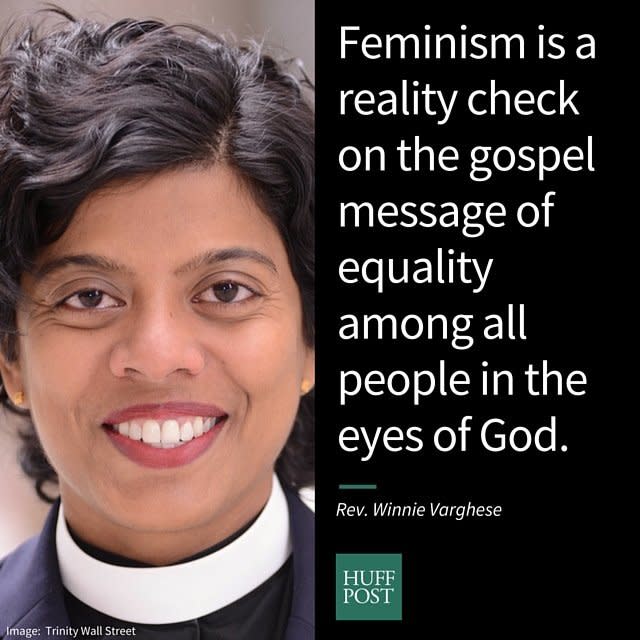
"As a Christian, feminism is a reality check on the gospel message of equality among all people in the eyes of God. If we believe we are equal in the eyes of God, we have to work to make that equality a reality in the world we live in. This has implications both for how girls and women understand their full humanity and dignity and how people of all genders understand the worth and dignity of women, which the church has historically profoundly influenced negatively."
Kate Kelly
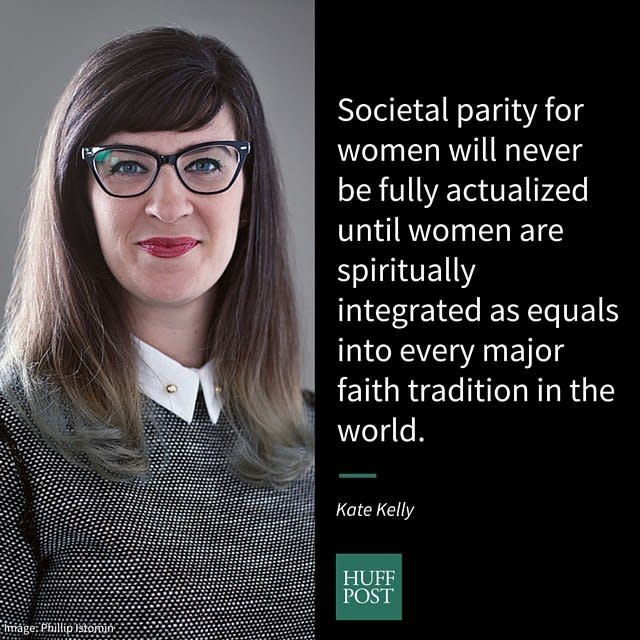
"In my home state of Utah, policy is heavily influenced by the Church of Jesus Christ of Latter-day Saints, which is an extremely patriarchal religion. Any Church that excludes women from leadership roles is clearly missing out on 50 percent of the potential, talents and wisdom of its adherents. But, religious gender discrimination also leaks out of the bounds of the institution and negatively impacts society at large. Utah has one of the largest income gaps between men and women, as well as one of the lowest female college graduation rates. The influence of the religious teachings that put women below men affect not only Mormon women, but all people that live in Utah… Societal parity for women will never be fully actualized until women are spiritually integrated as equals into every major faith tradition in the world."
Emilie M. Townes
![<i>Townes, Dean of Vanderbilt University's Divinity School, preferred to use the word “<a href="http://noteasybeingred.tumblr.com/post/206038114/alice-walkers-definition-of-a-womanist-from-in" target="_blank">womanist</a>,” a phrase coined by poet and activist Alice Walker to embrace the experiences of black feminists. Townes described the term this way: “Womanism is when historic and current insights of Black women are used to eradicate inequalities for all people with a particular focus on class, gender, race, sex and sexuality as social and theological tools to unseat evil.”</i><br /><br />"As a Christian, womanism underscores the power of the gospel working in our lives to set us all free from stereotypes based on gender, sexuality, race, class, physical ability, and all of the ways in which we are humans in God’s creation. Womanism is a spirituality of life that calls me to remember that my life is a gift from God and I should use this gift to work for peace and justice by sharing the good news and to work with others to craft a space and place for folks to thrive. This space and place, to my mind, is the church. It becomes the place that is genuine[ly] involved in being partners with God in bringing in the new heaven and new earth and an embodiment of love, hope, peace, and justice in a world that can use a good dose of each these days."](https://s.yimg.com/ny/api/res/1.2/OQaRo1ArtxbPM5rV6D0jrQ--/YXBwaWQ9aGlnaGxhbmRlcjt3PTk2MA--/https://img.huffingtonpost.com/asset/56faa4391e00009500711902.jpg)
"As a Christian, womanism underscores the power of the gospel working in our lives to set us all free from stereotypes based on gender, sexuality, race, class, physical ability, and all of the ways in which we are humans in God’s creation. Womanism is a spirituality of life that calls me to remember that my life is a gift from God and I should use this gift to work for peace and justice by sharing the good news and to work with others to craft a space and place for folks to thrive. This space and place, to my mind, is the church. It becomes the place that is genuine[ly] involved in being partners with God in bringing in the new heaven and new earth and an embodiment of love, hope, peace, and justice in a world that can use a good dose of each these days."
Gina Messina-Dysert
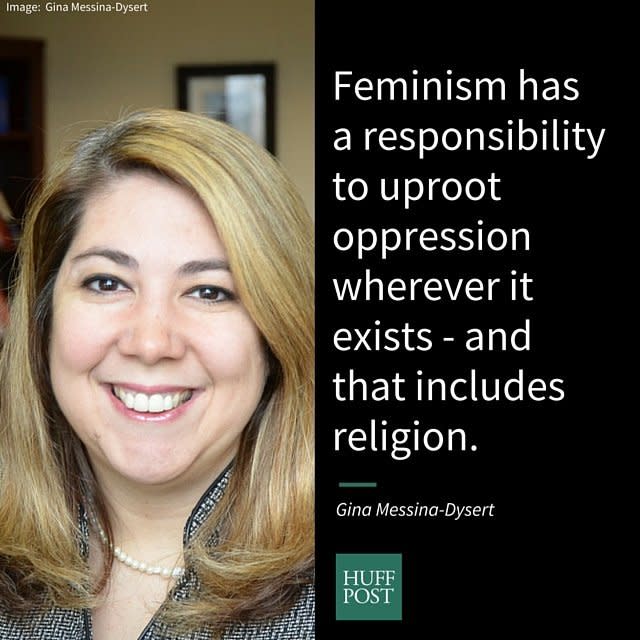
"While many believe the idea of a Christian feminist is an oxymoron, in truth, feminism and Christianity have a long history together. Although, many argue to be feminist is not to be Christian or vice versa, in fact, Christianity has feminist value. If we examine the foundation of the tradition, the idea that every person should be liberated and treated justly, this is very much in line with feminist ideals. Nonetheless, patriarchy has resulted in the manipulation of the tradition into one that has been utilized to oppress women. But with that said, feminism has a responsibility to uproot oppression wherever it exists - and that includes religion. And so, as a feminist lens is used to critique patriarchy in all aspects of society; it is critical that feminists continue to apply the same lens to religious traditions."
This article originally appeared on HuffPost.

